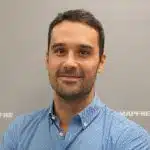INNOVATION| 23.06.2023
Physical exercise helps cure children with cancer thanks to Unoentrecienmil
The Unoentrecienmil Accelerator, one of the winners of the MAPFRE Foundation Social Innovation Awards, is a project that incorporates physical activity into childhood leukemia treatments. It is not just a measure to make the disease and hospital stay more bearable, or a tool to improve the emotional well-being of patients and families; in this project, exercise is an integral part of the treatment, which helps children’s healing and recovery.
Leukemia is the most common type of cancer in children. Great strides have been made in its study and it generally presents higher survival rates, but the treatments used, mainly chemotherapy, have very negative repercussions. Children are often left very weak, with hospitalizations that may last months, while patients remain in bed, their physical condition worsening, in addition to losing contact with the reality of children their age.
The data show that exercise works: it shortens hospitalizations 17%
Faced with this disease, of which 1,400 new cases are diagnosed each year in Spain alone, the only way to curb it is through scientific research. “We work to promote a cure for childhood cancer, specifically leukemia. This can only be done through research, there are no shortcuts,” explains Elena Huarte Mendicoa, director general of the Unoentrecienmil Foundation.
With this goal in mind, between 2018 and 2020 the foundation conducted research that came to a principal conclusion that is good news for children suffering from leukemia: doing physical exercise can shorten the period of hospitalization 17%, by strengthening children’s immune systems, which better prepares the body to receive the treatment. It also has a cardioprotective effect, preventing many of the cardiopathies associated with chemotherapy, improves muscle strength and recovery capacity, and mitigates the side effects of chemotherapy.
Once these encouraging results were obtained, the next step was to put them into practice. This led to the creation of the Unoentrecienmil Accelerator, the first non-pharmacological therapy unit in Spain, inaugurated in March at the La Paz hospital in Madrid. The initiative has three elements:
- A physical space
Divided in turn into a warm-up area, with elements related to sport and play, where social interaction is encouraged to build therapeutic adherence; the targeted exercise area, with gym machines that can adapt the sport to the needs of each patient; and the laboratory area, with machinery to measure the patient’s cardiovascular health status and collect all kinds of data.
- A technological application
On one hand, the app will be a tool for therapists, who will be able to correctly set the exercises, record the results and schedule new sessions. On the patient’s side, its goal is to achieve a fundamental part, adherence to the program, engaging the child with a gamified experience so that they follow all the prescribed exercises, making it easier for them to do them at home as well.
- A research project
Until now, the impact of exercise on cancer patients has been researched more in adults, for whom the prescription of physical activity is already commonplace. “We wanted to start down this path to put the focus on how these therapies can also help children, not just adults,” says Elena Huarte Mendicoa, Director General of Unoentrecienmil. Data from the Accelerator will expand scientific knowledge in this field.
Physical and emotional improvement for children
The unit is made up of a multidisciplinary team of oncologists, pediatricians, nurses and experts in child and youth education, with patients and their families as key players. After observing how it works, those responsible are pleased with the effects on patients: “The impact is dramatic,” says Unoentrecienmil’s general manager.
“It is incredible to be able to give pediatric cancer patients access to non-pharmacological therapy, which does not have any side effects, that complements and supports their usual pharmacological therapy. It helps these children feel better, they leave the hospital sooner, they have fewer heart problems, it alleviates the side effects of chemo, the children feel like exercising and not staying in bed…,” explains Elena Huarte.
Its benefits are not only physical, but also emotional and psychosocial. The physical space of the Accelerator provides a meeting place for the children, who thus resume the necessary relationships that they have often lost with their classmates and friends at school. Sports mixed with play is another motivation for the children, and keeps them further away from the reality of their hospital stay, which is especially hard at that age.
Although the project began at the La Paz hospital in Madrid, its intention is to extend to more hospitals, something possible thanks in large part to the digital application, which makes the model reproducible. In Spain, there are 49 hospitals dedicated to pediatric oncology, but only eight of them have spaces dedicated to physical exercise.
RELATED ARTICLES:




